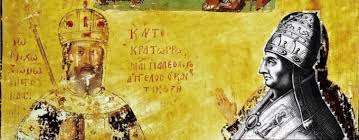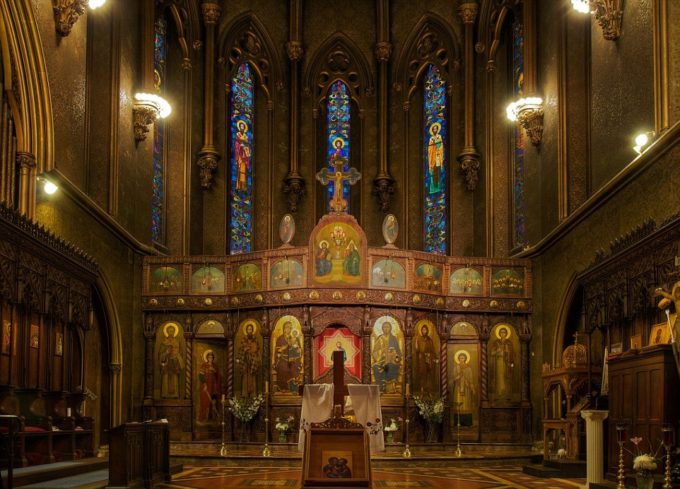Saint Nektarios of Pentapolis from Aegina
Schism, word which saddens our ear, word showing the denial of a sister Church, the separation of the brothers belonging to a sister Church and the row of unpleasant consequences following after it. What may be the reasons that caused the schism between the two Churches, the Eastern and the Western one which has been keeping separated for 12 centuries the brothers of the same blood? How great may be their significance that for centuries they remained relentless? Isn’t it possible their reconciliation and unification? We shall try to answer to all these three questions coming from both sides by this study, studying the matter from the historical point of view.
The causes of the schism pointed out by each one of the two churches are denied by the other: on one side the Western Church presents as a cause of the schism the arrogance of the Eastern Church which denies the primate of the pope in the Church in the way the Western Church understands it, as it follows:
- a) the establishment of the apostolic primate in the person of the most blessed Peter (of apostolic primates in beato Petro institutione).
b) the continuity of the primate at the Roman pontiffs (of perpetuation primatus Petri Romani Pontificis).
c) the nature and essence of the primate of the Roman pontiff (de vi et ratione primatus Romani Pontificis).
d) the principle of infallibility of the Roman pontiff (de Romani Pontificis infailibili magisterio).
These conceptions about Peter’s primate developed and were formulated and officially proclaimed. The dogmatic commission from Rome constituted by the pope before the convocation of what the Westerners called as the Ecumenical Council from 1870 gave to the members of the Council on 12th of July 1870 a schematic document with the title:
«The first dogmatic constitution about the Church of Christ » (Constitutio dogmatica prima de ecclesia Christi), where were enclosed the four previously mentioned points.
On another hand, the Eastern Church emphasizes as most important causes of the schism:
- a) the arrogant anti canonical claims referring at the primate of the popes of Rome contravening to the spirit of the One Holy Catholic Apostolic Church as it is formulated in the Holy Scripture defended and preserved by the seven Holy Ecumenical Councils.
- b) the innovations inserted by which the Roman Church moved away from the Orthodox Catholic Apostolic Church
- c) the infringement of the authority of the Holy Councils, the only ones who can hold the truth in the Church
Thus the causes of the separation as pointed out by the Western Church are four and those stressed by the Eastern Church are three. In order to reconciliate and unite it is needed to eliminate the causes but in this it lies the importance of the matter, because each one of the two Churches considers that the truth is on its side, pretending submission from the other and proposing as a condition of their unification, the acceptance of the papal primate as it is stated in its four points in what relates to the demands of the Western Church and in what relates to the Eastern Church on the other hand, brotherly equality „Primus inter pares” and right faith in accordance with the canons of the Ecumenical Councils which have infallibility.
The terms of the unification are of such a nature that make the aimed unification impossible, because there is no point of agreement between these, each one asking from the other no more and no less than to negate its own identity, its fundamental principles on which is founded the whole institution of the Church: because according to their views, the Western Church on one hand is founded on the papal primate and the Eastern Church on the other hand on the Ecumenical Councils. That is why the terms proposed by both parties for their unification become unacceptable because they destroy from foundations each Church and from here derive the concessions made by both parties which don’t lead to any result.
The primacy of honor granted to the pope by the Eastern Church is a useless concession because it lacks the power which can maintain the edifice of the Western Church. The concessions granted by the pope to the Eastern Church, to remain faithful to its own dogmas, customs and traditions are considered by the Eastern Church as being legitimate and based on the canons of the Church, reason which makes it persist on them and demand from the pope and the entire Western Church to think in the same way it does and expects that the pope and the whole Western Church should come back within it, renouncing at the life from before and approaching it with repentance.
Thus these apparent concessions have no meaning, are as if they didn’t exist: and in order to make possible the unification these concessions must suppress the main causes of the separation: these concessions will be meaningful when the pope renounces at what belongs to him and not when he tolerates the good traditions of the Church. As long as the main causes of the separation will remain as they are each one of the Churches will remain in what it is theirs and the unification is impossible. In order to be possible, the unification must be founded on the same principles, otherwise any effort is fruitless.
Excerpt from the book of saint Nektarios of Aegina – Why the pope and his followers separated from the Church of Christ, Evanghelismos Publishing, 2011.






